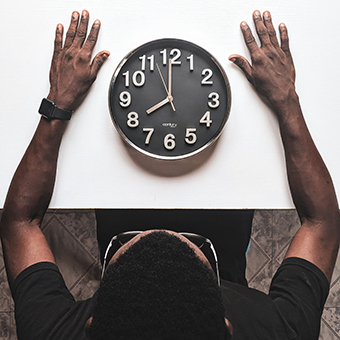What's the best way to tackle procrastination?
Wednesday, 08 March 2023
Procrastinating can become a debilitating pattern of behaviour.
The assignment you planned to start in week 3 of the semester is still in planning stages at week 6, and while you told yourself you'd focus on it during the study break, it's already halfway through the first week and you still haven't made a start.
There are lots of techniques you can employ to be more proactive and productive, and many suggestions are included in a tip sheet from the Counselling Team at Student Life.
Identifying the best time to undertake a specific task can be a helpful strategy, and you are more likely to concentrate better if you're well rested and fully energised. Setting a daily schedule where you block out when you'll tackle different tasks can be helpful.
For some people tackling complex tasks might be best suited early in the day, while other people might find later at night when the household becomes quieter is a better time. Work out what the best time is for you.
Often when we find ourselves facing a long list of things that need to be done, before we can actually start work, we come up with an even longer list of other tasks that need to be completed before we can begin. This can include everything from vacuuming the entire house, to making sure our home library is in alphabetical order, or creating the perfect playlist of ambient background music to aid concentration.
While these rituals can be pure procrastination, you can also create a positive habit by setting up a ritual that leads you into getting to the task. In his book The Power of Habit author Charles Duhigg outlines how we can built positive habits by setting up our own patterns of cues and rewards.
The cue for sitting in front of the computer to focus on study tasks might be first making a great cup of coffee, and the reward after working for a solid hour might be heading out for a quick walk around the park, or scrolling through TikTok for 10 minutes.
Research has suggested that it can take anywhere from 18 to 254 days for a new habit to be formed, but eventually it'll become second nature to you and you'll do it without thinking.
Creating a perfect space and developing a routine can help you focus on writing and researching, many famous authors have had very specific ways of working.
During his lifetime Somerset Maugham wrote 78 books, his ritual began with a morning bath where he would think of something to write about, then once he got to his desk he had a starting point. He wouldn't leave until he reached his daily goal of writing at least 1,500 words.
In an interview Ernest Hemingway dismissed rumours that he used to sharpen twenty number-two pencils before he could get started. He told the Paris Review he didn't think he'd ever owned that many pencils at once, but he did share that his workspace needed to be very precise. He liked to write standing up with a typewriter set on top of a chest-high bookcase. He also kept a daily word tally.
Maya Angelou also had a set routine to get down to work. The acclaimed poet and autobiographer said she liked to keep her home looking pretty, but it wasn't a space she could write in, so she used to hire a cheap hotel room to work from. She take with her a dictionary, a Bible, a deck of cards and a bottle of sherry and get to work free from any other distractions.
In his 2016 book Daily Rituals, Mason Currey discovered the different ways many different artists set up their day to be creative and productive, with a wide variety of levels of success.
The tip sheet for dealing with procrastination has twenty different strategies for helping you to focus and be more productive.
Take a look at all the Tip Sheets available that cover issues including dealing with stress, procrastination, living with housemates, avoiding burnout and how to get a great night's sleep.
